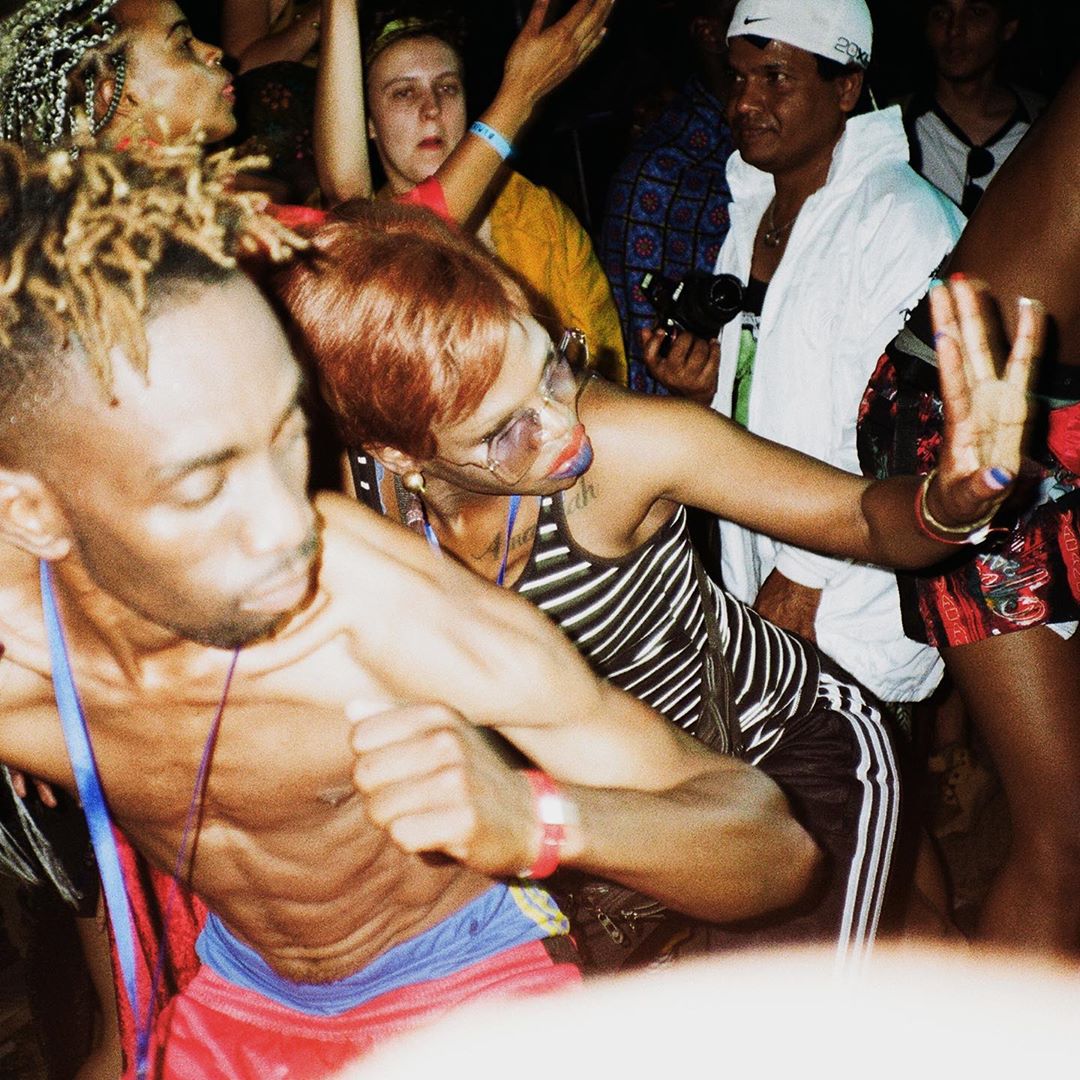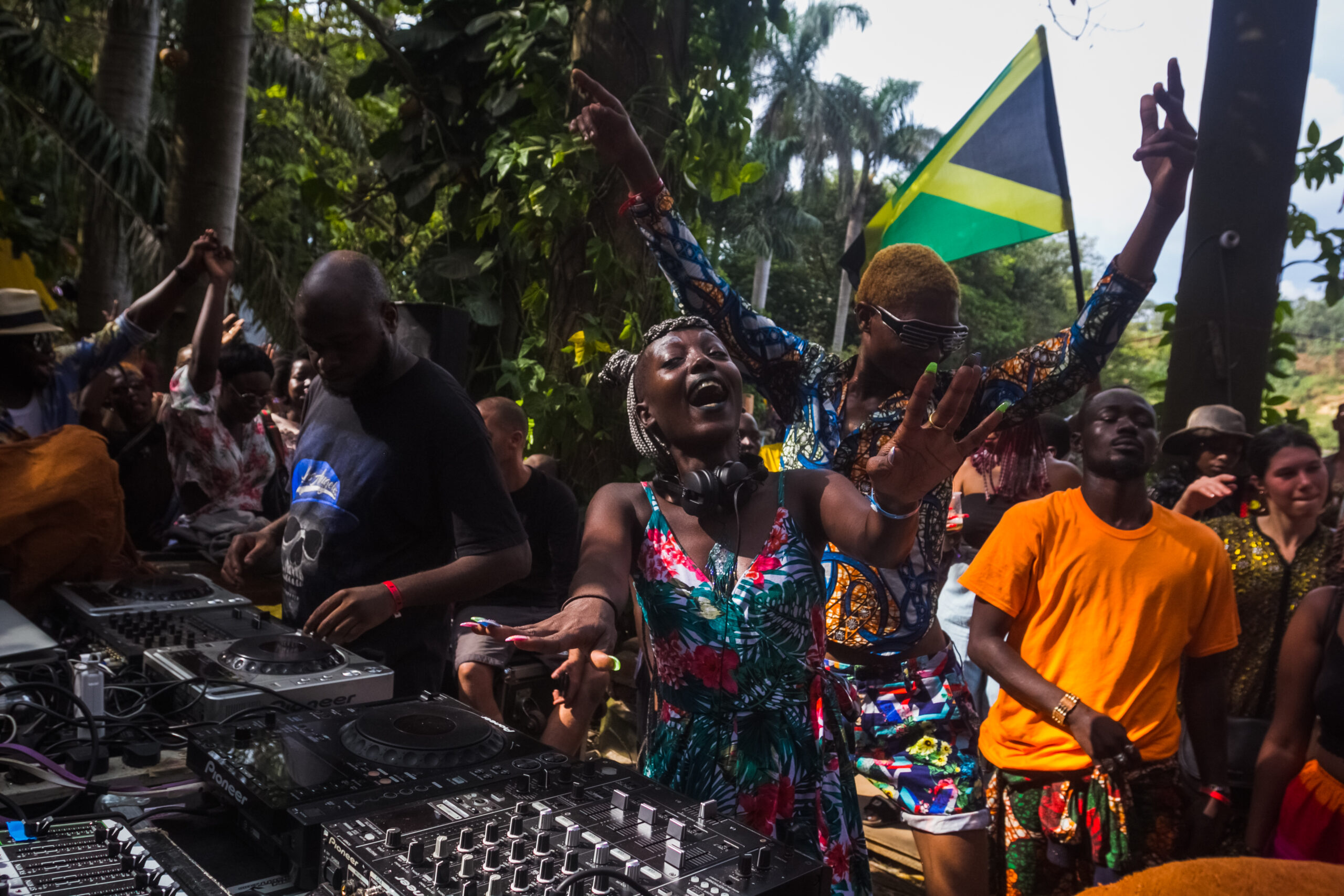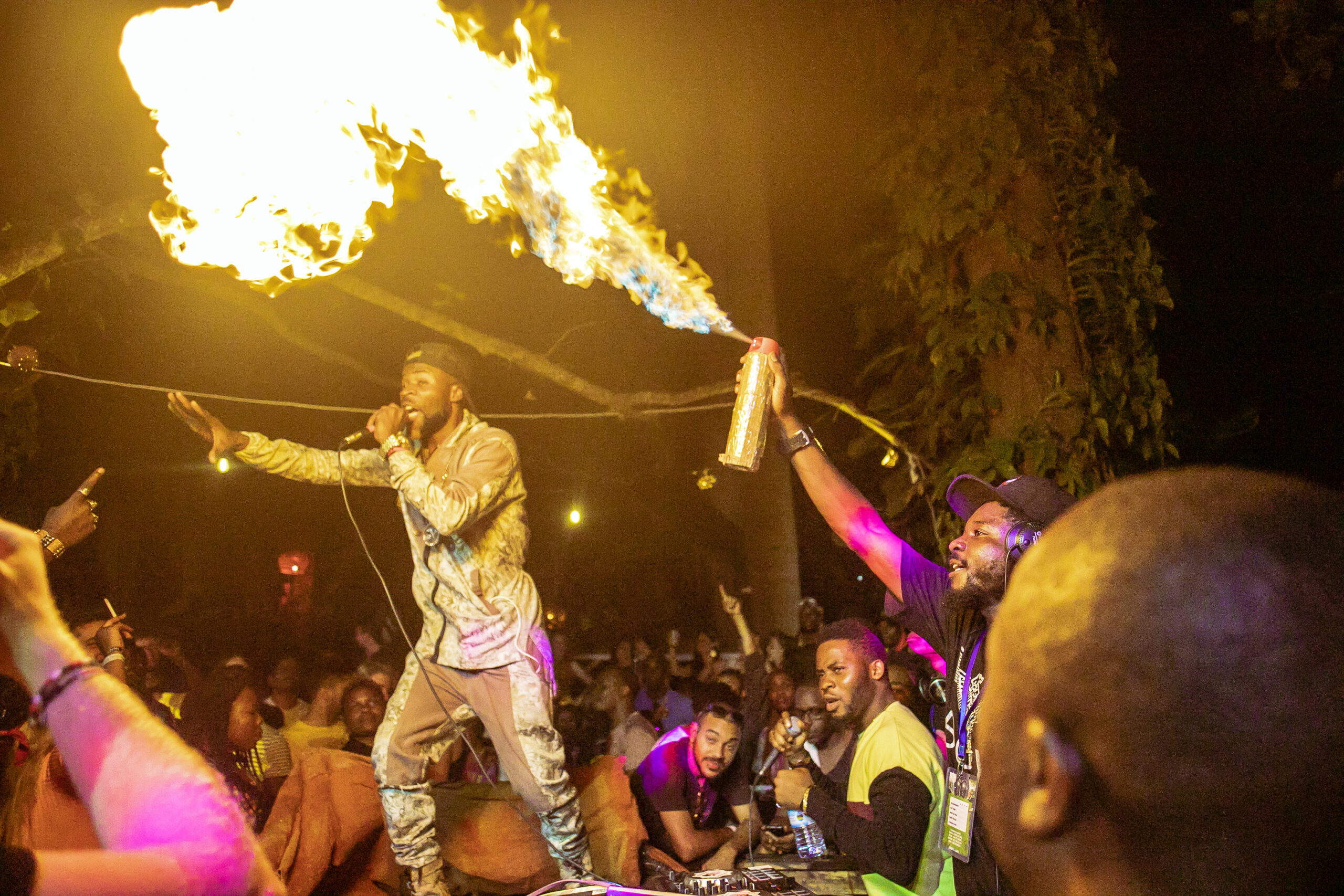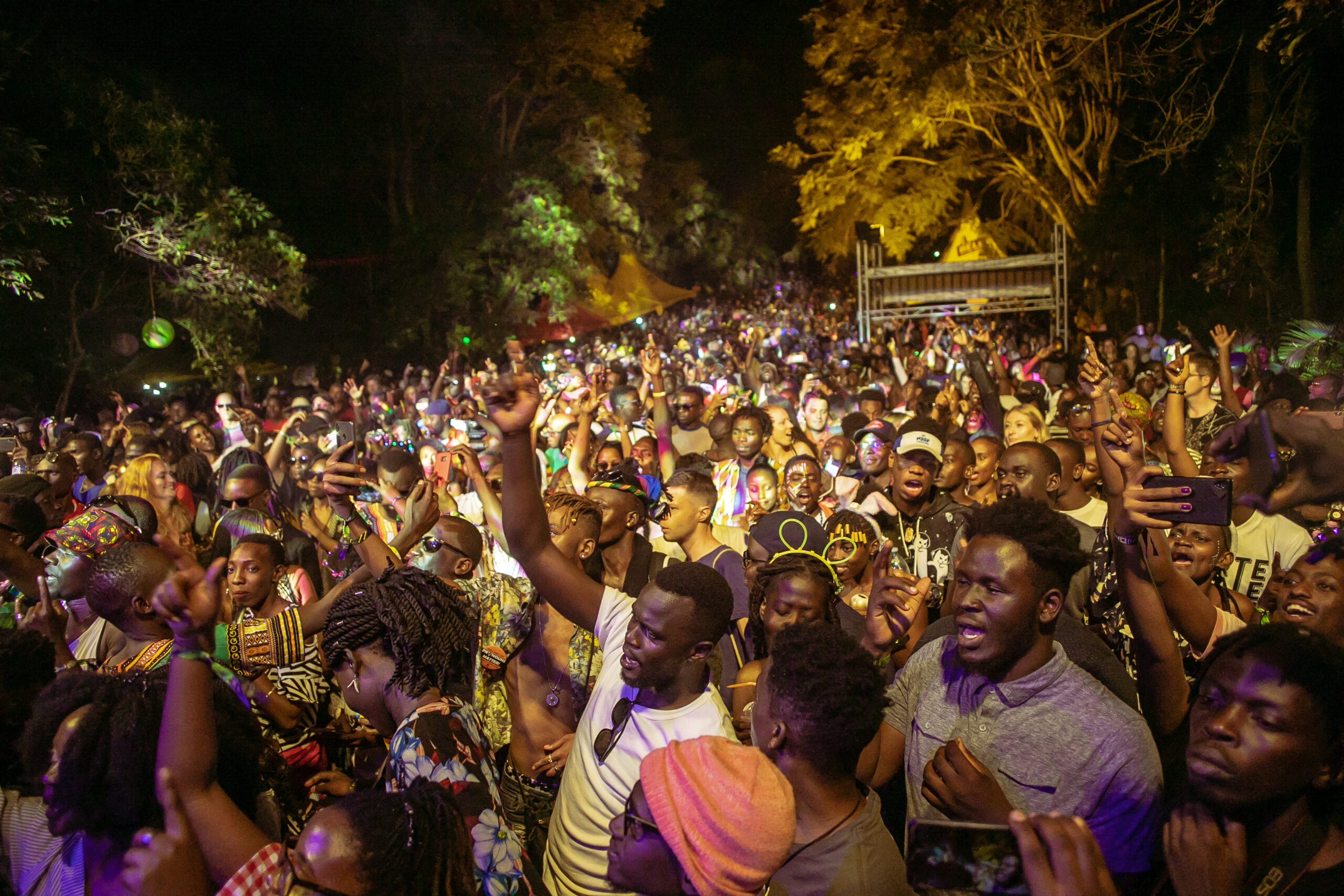Lean into ‘the uncontrollable urge to dance’

While the Dutch summer hasn’t been treating us too nicely, GarageFest is impending this weekend to bring some scorching heat of sonic liberation. Returning to its annual summer extravaganza, our beloved club joins forces with Nyege Nyege for a non-stop weekender celebrating the hottest (yet often criminally underrated) names of the underground arena.
The Uganda-born festival Nyege Nyege is known for uprooting the mainstream electronic scene with its eruptive energy, uplifting Black, Brown and Queer artists whose original sound is often imitated and profited off yet can’t be replicated. Within this, the community challenges the largely white-cis-male dominated structures of club culture, grounding the audience back to the purest and most genuine expressions of electronic music that come straight from the heart.
In anticipation of the weekend, we catch up with local heroes Shaun D and De Schuurman, and overseas babes KHX05, Suzi Analogue and Nsasi to talk about the chemistry behind their sound, share pre-show rituals, and spill the tea about the music industry. Of course, to properly get into the mood, we have also collaboratively curated a Glamcult Radical Tracks playlist to pass on the energy! So, put your headphones on, give your body to the music, and lean into what Nyege Nyege is here to bring – ‘an uncontrollable urge to dance’.
Describe your DJ style in 3 words!
Suzi Analogue: Black femme NRG!
Nsasi: Eclectic, avant-garde, trance-inducing.
De Schuurman: energetic, technical, playful.
What do you feel sets you apart from other artists?
Suzi Analogue: My sets are always a hybrid of DJing and live performance techniques, blended with sharing cultures and audio histories that I create and connect with from around the world.
KHX05: My ability to storytell and bring people into a world during my live sets. I feel like there is a spiritual tether that happens with me and the audience when I perform, and I feel like I don’t see that anymore during live shows.
Nsasi: My inspirations, experience and story. I find inspiration in universal themes and emotions that somehow connect to all of us. My view of work is from a perspective shaped by my experiences growing up in Uganda and discovering experimental music in the vibrant capital city of Kampala, with so much happening at the same time. Drawing from the city’s chaotic energy, I seek to build on this connection to web my exploration around collective resistance within my art to challenge norms. My sound is a blend of all these possibilities.
Shaun D: I believe that the music that I make and play really brought people together and has been the cause of some baby-making lol.
De Schuurman: Experience, fast-past mixing, and mostly playing only my own productions. And also not playing with headphones because I know my own tracks and I started deejaying with CD’s in 2009.

How do you approach building a story through your sets?
Nsasi: I enjoy taking different directions with building a story. While the story may have similar elements, it is presented in varying tones depending on the venue and the audience. My main intention is always to ensure that everyone has a good time, regardless of the setting or the context and also allowing myself to connect with the different audiences and energy of the space.
KHX05: A lot of my sets involve dancing, and through the choreography I always choose a beginning, middle, and end to my sets. It normally starts with the lowest energy or a song that gives an introduction, and builds gradually so by the end there is this climax and then a resolution.
How does your work interact in the communities you exist within?
Suzi Analogue: In my community, we collectively build walls of sound that further build whole communities. My sound, tapes and releases are a part of that ecosystem, and from within the ecosystem our audio helps us world-build.
KHX05: In the simplest form, my music is played at functions ran by my community. My work reflects my community and my work is for my community. Outside of this purest form of it, it’s also about finding ways to bring more people to the music via social media and things like that.
De Schuurman: It binds different cultures together because of the innovative sounds i play, so mainly the urban and African diasporic sounds with the techno sounds because of the synths and aggressive drums!
If you could change anything about the music industry, what would it be?
KHX05: How the music industry centers capitalism and exploits artists. Especially the mainstream music industry seems to be centered around a person’s productivity and what they can produce – even if it is not something that they want to produce. If they don’t, the artist gets discarded. Another thing is artists support. There are not a lot of spaces that make sure that non-mainstream artists have the resources that they need to continue to create their art.
Nsasi: It would be to shift the perception of the standards that influence the collective evaluation of music in the industry. These standards often reflect and prioritise white-centric perspectives, but we need to be more inclusive and reflective of diverse voices, approaches, experiences to artistic expression.
Shaun D: Everything. I think it’s time for a new system which benefits the artists more than the platforms they use.
De Schuurman: Being more critical in looking at techniques & performance. Everyone can’t just be a deejay, things shouldn’t be THAT easy.

In your opinion, what is the most underrated music scene at the moment?
Suzi Analogue: I think club music in general is more misunderstood than it is underrated. Globally, we now understand the experience value of the interactions that we get from club music. However, a lot of modern club music was developed in the USA. Like techno East Coast club music, that we now call Jersey club, was born in Baltimore – the same place I was born… Baltimore has a rich history in the context of the Whole Road even. Even Nina Simone wrote a song called Baltimore. Not enough people know the true story behind how we got the club sounds of today, so it is important to learn and share musicians that come from those scenes. This is the goal of our label and collective NeverNormal Records, and NeverNormal Soundsystem.
KHX05: Oh my god, easy! The underground queer and trans music scene is the most underrated. PERIOD.
Shaun D: I think that is moombahton at this moment.
De Schuurman: Bubbling from Holland, what I make & Singeli from Tanzania!!
Who stands out to you in a crowd when you play?
Suzi Analogue: The people that are moving and connecting with the sound stand out the most to me. I can tell who’s really listening. The people in the crowd who know what to do with the sound that I share out, are those real ONEZ.
KHX05: Oh okay, so.. two people stand out to me in a crowd! One, the person that is putting their whole life into dancing and fully engulfing themselves in the experience. The other person is the one that is quiet, not moving and just staring at the performance. Like what is happening there? Are you in a trance? Are you anxious? What’s the tea? It gives this mystery vibe.
Nsasi: For me every person is a unique stand out and adds to the energy of my performance. I recognise all energies on the dancefloor even those that would stand in awe and not move.
What is something you wish you knew when you’d just started DJing?
Suzi Analogue: Something that I discovered in my journey of DJing is to make sure to tell a story with the blends. Once I started to create my own stories with my mixes, I found more meaning and ways to connect the music with my own journey. Also, just to stay so organised with all of your audio files!
Nsasi: When you share a background that is without privilege and where you have had to navigate so many systems to make one thing work, your only wish in life is to make it. I’m currently making it work as a DJ and I continue to discover myself even more in this direction. No regrets. The past is not only behind us, it is ahead of us too!
Shaud D: It’s okay to be different in your sound and to stand for what you believe in.
De Schuurman: How much politics can go into this music scene. It wasn’t like that when I started out – you had to be good and learn through failing loads of times.

Who are you most excited to see at Nyege Nyege?
Suzi Analogue: I’m excited to see the whole squad. I cannot wait to see Hibotep, Nsasi and Nkisi and for everyone to meet the Never Normal Soundsystem crew.
Nsasi: Am so excited to catch my favs Nkisi, and the Never Normal crew. Really looking forward to KHX05 and Heavee. Literally everyone.
Shaud D: Hibotep, Le poodle, Derek, Arlen, PO and the rest of the team!
What is your most controversial opinion / hot take about the club scene at the moment?
Suzi Analogue: With the club, I do not immediately think to provoke controversy. I think about provoking truthfulness and honesty. I just think that the real producers creating the sounds and trends are not getting paid the highest fees currently and it should not be that way. Us, original producers, should be receiving top opportunities, not the people who mimic our sound. We need to redistribute the power in club culture to honor the originators, innovators and composers of old and new.
KHX05: Currently it is that I hate the co-opting of the club scene by straight, cisgender, white men who are making so much money off the sound that was created by black and brown people, and queer and trans people. It is really fucked up. My opinion is that these white men need to sit the fuck down for a little bit and/or use their platform to uplift the community that created the sound, which I don’t see a lot of.
Nsasi: For me it’s the double standards and the culture of pretence among promoters, bookers and most cultural producers behind the scenes trying to make do with diversity quotas. We are in a time where it’s key to advocate for fair and inclusive platforms for all artists, especially those representing places that have been affected by wars, black and queer artists.
Shaun D: I think we’re in front of a big shift in musical development. People are really in need of something new and refreshing that connects them closer to god, the source, the universe, or whatever you want to call it.

Why do you think it’s important to have organisations like Nyege Nyege?
Suzi Analogue: Nyege Nyege is an important incubator for the underground music movement, and electronic and dance experiences. They are creating more accessibility for new and lesser known underground artists to reach large crowds who will dance with them and that is quite powerful and important.
Nsasi: They provide artists with exposure and opportunities that might seem of far reach for artists, especially those from the global south and other regions. They both promote their music and document their contributions to the industry.
De Schuurman: Because they actually put on the artist that come with innovate sounds. Many world famous DJs or labels don’t do that – they just make that genre but they don’t work with the originators.
Finally, in the anticipation for the weekend, do you have any pre-show rituals?
Suzi Analogue: Before a show, I need to be able to get into my process of putting on my fit. This gives me creativity and calms my mind, and connects me with myself before I share my energy with the dance floor. Also drink coconut water to hydrate!
KHX05: Yes, yes, yes! It’s meditation, then having a shower concert, doing my makeup, smoking some weed, and getting my life together. That combo gets the girl together every time!
De Schuurman: Nope. Also no soundchecks. I don’t see the point.